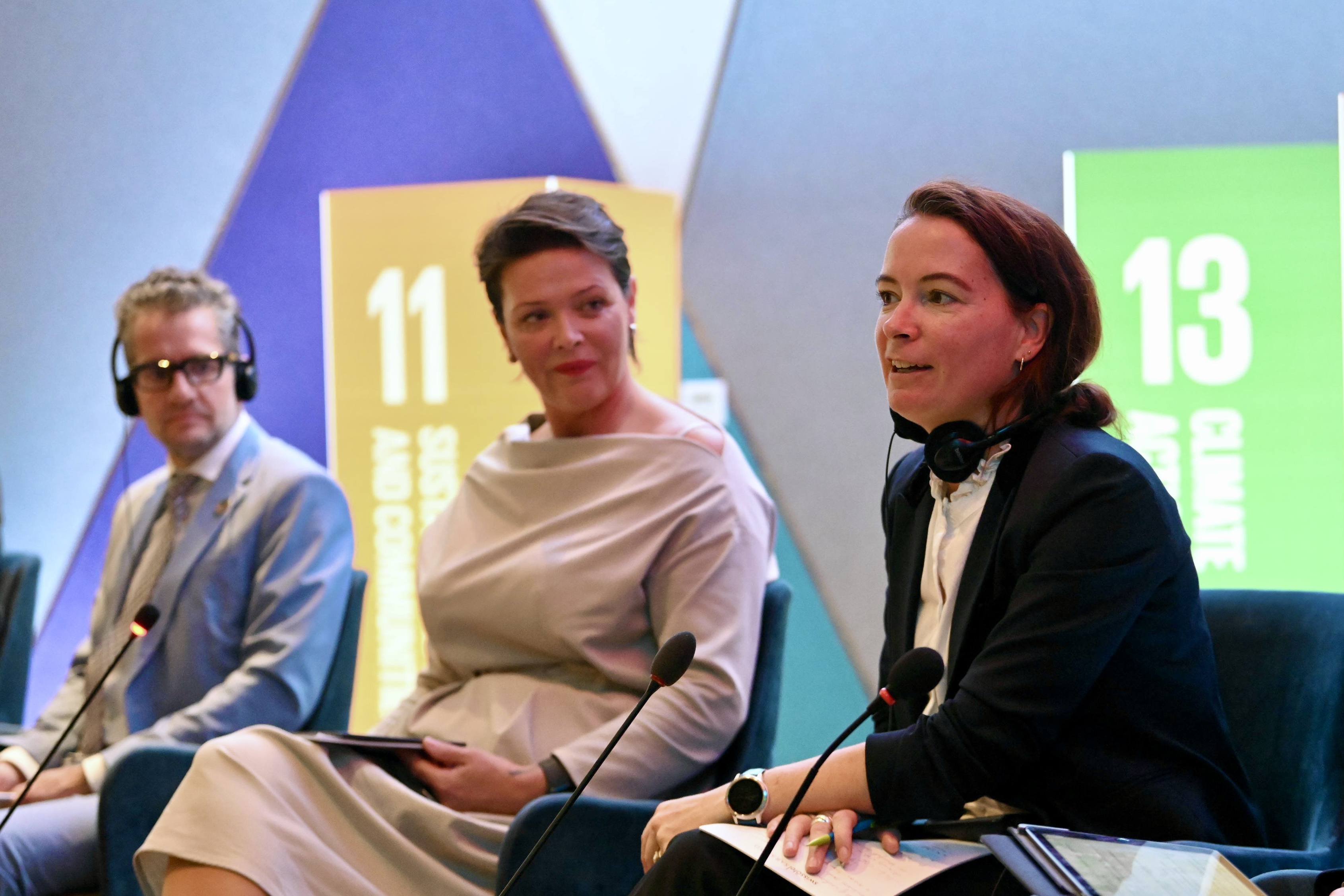 Fedra Vanhuyse at SDG Week in Sarajevo. Photo: UNDP.
Fedra Vanhuyse at SDG Week in Sarajevo. Photo: UNDP.
 Fedra Vanhuyse at SDG Week in Sarajevo. Photo: UNDP.
Fedra Vanhuyse at SDG Week in Sarajevo. Photo: UNDP.
The Sustainable Development Goals (SDG) Week under the theme “Accelerating Action for a Sustainable Future” is taking place in Sarajevo now; it is a week full of inspiration, innovation and action on how to accelerate the SDGs, with only five years left of the 2030 Agenda. The Stockholm Environment Institute (SEI), the implementing partner of BiH SuTra, took part in the opening ceremony, organised by the Embassy of Sweden and the United Nations Development Programme in Bosnia and Herzegovina (UNDP BiH).
Fedra Vanhuyse, who represented SEI, is the Head of the Division “Societies, Climate and Policy Support” and Senior Research Fellow at SEI. She is also finance and procurement strategist at Viable Cities, a strategic innovation program with the mission of climate neutral cities by 2030. She highlighted SDG-driven work by cities in Sweden and other countries in one of the panels at the opening ceremony. Participants confirmed the relevance and importance of the SDGs in designing sustainable societies. Five local governments in Bosnia and Herzegovina — specifically, the City of Gradiška, the Municipality of Tešanj, the Municipality of Novo Sarajevo, the Municipality of Žepče, and the City of Bijeljina — were awarded as champions of local sustainable development. They were recognized for their work aligned with the SDGs as being highly dedicated and engaged to advancing positive transformation in the categories of “smart growth”, “good governance”, and “equal opportunity society”.
“We need to be creative in imagining sustainable societies and not only suggesting incremental improvements. The impacts of climate change, particularly in countries with hilly and mountainous topography like Bosnia and Herzegovina, are becoming more apparent with more frequent occurrences of floods, droughts and landslides. Acting decisively on climate change – both in reducing emissions, adapting to the changing climate, and preserving biodiversity is paramount. Delaying action or inaction will only increase the costs,” Vanhuyse emphasised at the event.
Collective agreement to increase the pace of climate action
Fedra Vanhuyse presented a tool widely used in Sweden for planning climate neutrality in cities and municipalities, The Climate City Contract, which has been developed under Viable Cities. The Climate City Contract has a strong focus on financing, and has been used across Europe in the EU Mission for Climate-neutral and Smart Cities, with Sarajevo being one of the participating cities. She further explained: “The Climate City Contract is an innovative governance tool, bringing together stakeholders at the local, regional, and national level to commit to climate neutrality. By including an action plan and investment plan, local authorities can easier assess the economic opportunities and investment needs related to their sustainability transitions and are further supported in the directing and redirecting both public and private finance”.

The role of architects
While in Sarajevo, Fedra Vanhuyse also presented results of the research project Material Assets Valuation: Estimating Risks and Impacts of Climate Change (MAVERIC) funded by Sweden's Innovation Agency Vinnova, to a group of architects at the Walter AEC Firm and students from the Faculty of Architecture, alongside the Swedish Embassy. This project explores the impact of climate risks on real estate values by modelling how factors such as climate risk can affect property prices, loan-to-value ratios, and insurability. Architects are crucial in creating a sustainable built environment, through their designs but also as advocates for comprehensive and sustainable spatial planning as well as building regulations and codes.

Discover the News and Updates section, delivering the latest updates and insightful content across various topics. Stay informed with most recent news articles, reports, and publications, of the BiH SuTra project.